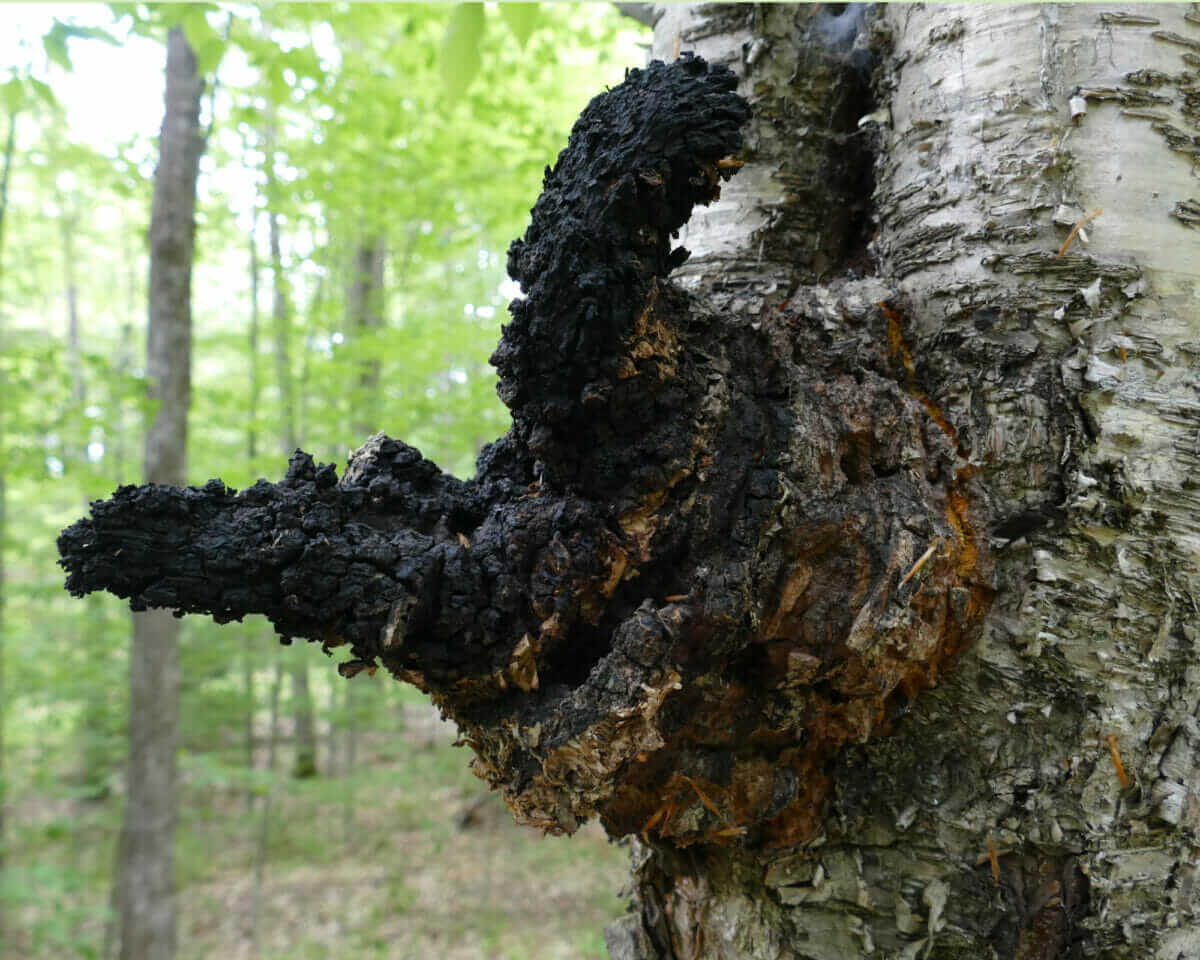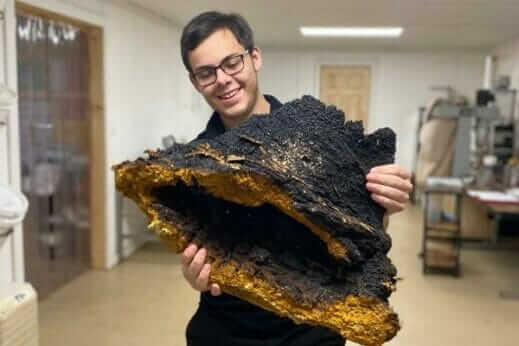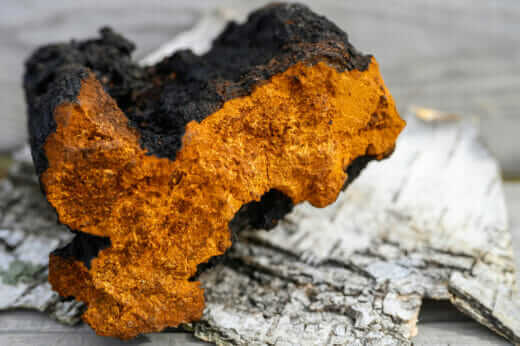As Chaga Keeps Trending, Mycologists Worry About Running Out
Chaga, a fungus found in colder climates, is a trendy ingredient in supplements and functional foods. But some foragers worry the supply is growing thin.
As Chaga Keeps Trending, Mycologists Worry About Running Out
Chaga, a fungus found in colder climates, is a trendy ingredient in supplements and functional foods. But some foragers worry the supply is growing thin.

by Garrett Kopp
Garrett Kopp learned to harvest wild chaga alongside his grandmother in the Adirondack Mountains of New York when he was a teen. In 2015, at 16 years old, his first stop after getting his driver’s license was the Franklin County Clerk Office where Kopp registered his new business—Birch Boys Chaga. The company has been harvesting and selling chaga ever since. Kopp says the demand for chaga spiked in 2020 and remains steady. “We brought in 3,000 pounds of chaga this year—more than we ever have. The market has grown, and it looks like it’s here to stay.”

You’d be forgiven if you’ve never heard of chaga—the parasitic fungus isn’t exactly well known outside of wildcrafting communities. It infects many species of trees, most notably birch, and erupts as a crusty black mass of hardened fungal hyphae (called a sclerotia). It’s not exactly the traditional muse of poets and painters looking to nature for inspiration. Found in boreal forests and sub-arctic forests in Canada, parts of the US, Siberia, Scandinavia and other suitably cold climates, chaga has featured prominently in the folk medicine of various northern cultures. The fungus is now enjoying a renaissance of sorts in North America as interest in functional foods and adaptogens intensifies. A quick perusal of Amazon reveals a staggering amount of chaga products: tea, tinctures, powders, chunks and capsules.
But what does science say? Is chaga deserving of all the recent praise? The answer is an unsatisfying “maybe.” A 2010 study found that chaga extracts reduced glucose levels in diabetic mice by up to 36 percent. Another study exploring antioxidant effects showed cells pre-treated with chaga had 40 percent less oxidative damage from free radicals than cells that were not treated. A 2022 study investigated the anti-inflammatory properties of chaga and found a new extraction method reduced nitric oxide production, which can spur inflammatory disorders, by 58 percent.
The most intriguing finding, however, is chaga’s anti-tumor activity. Numerous studies have demonstrated chaga’s ability to destroy different types of cancer cells (i.e., sarcoma, lung adenocarcinoma, colon cancer, melanoma and bladder cancer). But without large-scale human trials, its ultimate clinical effectiveness remains unknown.
However, by the time we have sufficient evidence to evaluate its clinical benefits, chaga may be a scarce commodity. Many are worried that increasing market demands are putting excessive pressure on this natural resource.
Disconcertingly, we don’t have a good understanding of current distribution or population trends. Experts do know that chaga contributes to important nutrient recycling and carbon sequestration, and mycology experts fear we are harvesting large quantities of this organism without understanding the long-term ecological impact.
When it comes to chaga harvesting, sustainability is complicated by a number of factors. Chaga is very slow growing and takes decades to form reproductive structures. But harvesting only occurs in the pre-reproductive form, meaning foragers take the fungus before it’s had a chance to produce spores.
“Timber-centric” foresters also endanger chaga—placing little value on any part of the forest ecosystem outside of timber. Yellow birch trees infected with chaga (considered a parasite that ruins the timber value) are targeted for destruction. This year, Birch Boys managed to intervene and salvage 500 pounds of chaga from birch before they were decimated, but that’s only because they’ve established a personal relationship with one of the foresters. Kopp says many people aren’t aware that logging and deforestation threaten chaga populations.

In the Adirondacks, Kopp estimates they’re 10 to 12 years away from a real chaga shortage, but he’s hopeful efforts to wild-farm chaga will change that trajectory. Birch trees can be inoculated with chaga by drilling holes in the trunk and inserting dowels with live chaga mycelium. KÄÄPÄ Forest, a Finnish company, is doing just that—creating the largest chaga cultivation network in the world. After researching and testing dozens of mushroom strains to optimize germination and growth speed, the company has started signing cultivation contracts with farmers in Finland, promising to buy the chaga back from these farmers at the agreed market price when it is harvested. This requires a lot of patience—farmers can expect to wait 10 years before harvesting their crop. KÄÄPÄ Forest expects its first crop in 2028 and estimates a harvest of 11,000 pounds. By 2031, yields are expected to rise to 141,000 pounds with estimated sales of $8.5 million.
Eric Puro serves on the board of the International Medicinal Mushrooms Society and is the CEO of KÄÄPÄ. He sees chaga cultivation as an important conservation effort and says it also offers ecological benefits such as increasing forest diversity and carbon sequestration. “Low-yield birch trees that would normally be thinned will remain in the forest,” he says. According to Puro, Metsähallitus (the Finnish Forest Administration) believes that KÄÄPÄ’s chaga cultivation forests will sequester about 50,000 tons of carbon annually.
Finland is the only country in the world tackling the problem of overharvesting at a national level. The government issues harvesting permits and only allows foraging in areas deemed ecologically stable. Regulations stipulate that Finland can sustainably harvest about 44,000 pounds of wild-foraged chaga per year—“a drop in the bucket,” according to Puro, who estimates global chaga consumption to be at least one billion pounds per year.
Back in the Adirondacks, Kopp is eagerly looking for land partners and has a lease agreement in hand. Birch Boys is venturing into cultivation and needs access to birch trees. Like Puro, he believes wild farming—and diversification of land management as a whole—will play an important role in chaga’s future.
Follow us

This work is licensed under a Creative Commons Attribution-NoDerivatives 4.0 International License.
Want to republish a Modern Farmer story?
We are happy for Modern Farmer stories to be shared, and encourage you to republish our articles for your audience. When doing so, we ask that you follow these guidelines:
Please credit us and our writers
For the author byline, please use “Author Name, Modern Farmer.” At the top of our stories, if on the web, please include this text and link: “This story was originally published by Modern Farmer.”
Please make sure to include a link back to either our home page or the article URL.
At the bottom of the story, please include the following text:
“Modern Farmer is a nonprofit initiative dedicated to raising awareness and catalyzing action at the intersection of food, agriculture, and society. Read more at <link>Modern Farmer</link>.”
Use our widget
We’d like to be able to track our stories, so we ask that if you republish our content, you do so using our widget (located on the left hand side of the article). The HTML code has a built-in tracker that tells us the data and domain where the story was published, as well as view counts.
Check the image requirements
It’s your responsibility to confirm you're licensed to republish images in our articles. Some images, such as those from commercial providers, don't allow their images to be republished without permission or payment. Copyright terms are generally listed in the image caption and attribution. You are welcome to omit our images or substitute with your own. Charts and interactive graphics follow the same rules.
Don’t change too much. Or, ask us first.
Articles must be republished in their entirety. It’s okay to change references to time (“today” to “yesterday”) or location (“Iowa City, IA” to “here”). But please keep everything else the same.
If you feel strongly that a more material edit needs to be made, get in touch with us at [email protected]. We’re happy to discuss it with the original author, but we must have prior approval for changes before publication.
Special cases
Extracts. You may run the first few lines or paragraphs of the article and then say: “Read the full article at Modern Farmer” with a link back to the original article.
Quotes. You may quote authors provided you include a link back to the article URL.
Translations. These require writer approval. To inquire about translation of a Modern Farmer article, contact us at [email protected]
Signed consent / copyright release forms. These are not required, provided you are following these guidelines.
Print. Articles can be republished in print under these same rules, with the exception that you do not need to include the links.
Tag us
When sharing the story on social media, please tag us using the following: - Twitter (@ModFarm) - Facebook (@ModernFarmerMedia) - Instagram (@modfarm)
Use our content respectfully
Modern Farmer is a nonprofit and as such we share our content for free and in good faith in order to reach new audiences. Respectfully,
No selling ads against our stories. It’s okay to put our stories on pages with ads.
Don’t republish our material wholesale, or automatically; you need to select stories to be republished individually.
You have no rights to sell, license, syndicate, or otherwise represent yourself as the authorized owner of our material to any third parties. This means that you cannot actively publish or submit our work for syndication to third party platforms or apps like Apple News or Google News. We understand that publishers cannot fully control when certain third parties automatically summarize or crawl content from publishers’ own sites.
Keep in touch
We want to hear from you if you love Modern Farmer content, have a collaboration idea, or anything else to share. As a nonprofit outlet, we work in service of our community and are always open to comments, feedback, and ideas. Contact us at [email protected].by Tammy Kuepfer, Modern Farmer
June 9, 2023
Modern Farmer Weekly
Solutions Hub
Innovations, ideas and inspiration. Actionable solutions for a resilient food system.
ExploreShare With Us
We want to hear from Modern Farmer readers who have thoughtful commentary, actionable solutions, or helpful ideas to share.
SubmitNecessary cookies are absolutely essential for the website to function properly. This category only includes cookies that ensures basic functionalities and security features of the website. These cookies do not store any personal information.
Any cookies that may not be particularly necessary for the website to function and are used specifically to collect user personal data via analytics, ads, other embedded contents are termed as non-necessary cookies.
Wow! So interesting. One of these days…a cure for cancer might be found.
Great article! There is a company right here in Maine that does this commercially too, just like you describe. They are all over the news here and have been for the better part of the last 8 months or so. https://youtu.be/ns2YhxfaZCY
I met them at our annual foresters conference early this spring. They are very friendly and knowledgeable!
Excellent article!
I am intrigued by the chaga products.
I used to grow mushrooms, so I know that actually growing and caring for this food is not easy. The weather and environmental conditions of the fungi are the prerequisites affecting the growth of the fungus.
I found your article on the rising trend of Chaga fascinating! As someone who enjoys exploring natural remedies, it’s exciting to see the increased interest in this unique fungus. The insights from mycologists added a thoughtful perspective, and it’s essential to consider sustainability in the harvesting process. Your article struck a perfect balance between highlighting the trend and raising awareness about potential challenges. Great read!
My husband has recently been diagnosed with bladder cancer and has been treated with resection and chemo! I know the healing effects of Chaga and have purchased some from Siberia. I met a woman yesterday in price chopper and we got to talking, long story short her father had bladder cancer and she treated him with high doses of chaga, no chemo no surgery cancer gone! God has given us all the tools right here growing, we’re just so dependent on what the doctors say then to use medicinal plants! I will begin a chaga treatment for my husband and… Read more »